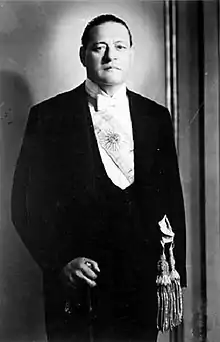Roberto M. Ortiz | |
|---|---|
 | |
| President of Argentina | |
| In office 20 February 1938 – 26 June 1942 | |
| Vice President | Ramón Castillo |
| Preceded by | Agustín P. Justo |
| Succeeded by | Ramón Castillo |
| Personal details | |
| Born | 24 September 1886 Buenos Aires, Argentina |
| Died | 15 July 1942 (aged 55) Buenos Aires, Argentina |
| Political party | Radical Civic Union |
| Other political affiliations | Concordancia |
| Spouse | María Luisa Iribarne Daubert |
| Profession | Lawyer |
Jaime Gerardo Roberto Marcelino María Ortiz Lizardi (24 September 1886 – 15 July 1942) was the 19th President of Argentina from 20 February 1938 to 27 June 1942.
Ortiz is a little remembered president. He became president in 1938 following a presidential election that has been described as being among the most fraudulent in Argentine history.[1] His main management objective was to end fraud. The attempt to normalize the institutions confronted him with his vice president, Ramón Castillo, leader of the conservative sectors of the government coalition. The president and vice president belonged to different political groupings. Ortiz was a radical antipersonnel and Castillo, a conservative in the National Democratic Party. Both were part of the formula of Concordancia, a coalition that had ruled since 1932.[2]
Life
Ortiz was born in Buenos Aires on 24 September 1886. As a student at the University of Buenos Aires, he participated in the unsuccessful Argentine Revolution of 1905. In 1909 he graduated from the university and became a lawyer.[3]
He became active in the Radical Civic Union and was elected to the Argentine National Congress in 1920.[3] He served as Minister of Public Works from 1925 to 1928.[3] He supported the Revolution of 1930 and served as Minister of the Treasury from 1936 to 1937.[4]
Presidency
In the presidential elections of 1937, he was the official government candidate and won, though the opposition accused him of participating in fraud, as irregularities were widespread.[5] Ortiz never denied these charges, but once he took office, he tried to make Argentine politics more open and democratic.[6] Soon after becoming president, Ortiz became seriously ill with diabetes and on 3 July 1940, he delegated his powers to Vice President Ramón Castillo.[7][6] He favored the Allies during World War II,[8] but because of opposition within the army, he did not break relations with the Axis powers.[6] He resigned from the presidency on 24 July 1942, three weeks before dying of bronchial pneumonia at age 55.[9][3]
Honours
See also
References
- ↑ "1930/39 La década infame". www.cronista.com. El Cronista. 26 February 2008. Archived from the original on 30 December 2010. Retrieved 2 March 2022.
- ↑ Perochena, Camila (25 April 2021). "Presidentes en la tormenta: Ortiz y Castillo, una puja feroz en el seno del poder". La Nación.
- 1 2 3 4 "Necrology". Bulletin of the Pan American Union. The Union, 1910-1948. 76: 660. 1942. ISSN 2332-9424. OCLC 4326477. Retrieved 2 March 2022.
- ↑ "ARGENTINE CABINET FILLED; Roberto O. Ortiz Is Finance Minister in New Set-Up". The New York Times. 1 January 1936. Retrieved 2 March 2022.
- ↑ "ORTIZ ELECTION CERTIFIED; Argentine Congress Proclaims the Winner in Presidential Poll". The New York Times. 26 November 1937. Retrieved 2 March 2022.
- 1 2 3 Domingo Cavallo; Sonia Cavallo Runde (3 February 2017). "From the Fall of Yrigoyen to the Rise of Perón". Argentina's Economic Reforms of the 1990s in Contemporary and Historical Perspective (Illustrated ed.). Routledge. p. 1922. ISBN 978-1317364665. Retrieved 2 March 2022.
- ↑ "CASTILLO, EX-HEAD I OF ARGENTINA, DIES; Conservative Was Forced Out of Office by Coup in 1943 — Curbed Nation's Press". The New York Times. 13 October 1944. Retrieved 2 March 2022.
- ↑ Lauderbaugh, George M. (2007). "Argentina Shifts Toward the United States". In Sheinin, David (ed.). Latin America During World War II (Illustrated ed.). Rowman & Littlefield. p. 190. ISBN 978-0742537415. Retrieved 2 March 2022.
- ↑ "R. M. ORTIZ IS DEAD". The New York Times. 16 July 1942. Retrieved 2 March 2022.